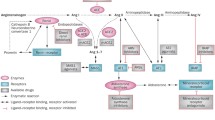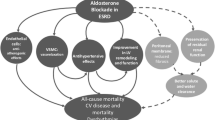Abstract
Recent preclinical and clinical studies indicate that aldosterone, independent of angiotensin II and elevated blood pressure, may play a role in health and disease. In addition to its role in fluid and electrolyte balance and circulatory homeostasis, more recent studies have identified aldosterone as a critical mediator of vascular damage. In animal studies, aldosterone is implicated in cardiac and vascular fibrosis, renal disease, and cerebrovascular damage. These lesions are prevented by specific aldosterone receptor blockade. In clinical studies, aldosterone receptor antagonism is associated with decreased hospitalization, symptomatology, and mortality, and improvement of endothelial dysfunction in patients with chronic heart failure. A better understanding of aldosterone’s actions in nonepithelial tissues should pave the way to better protection of organs at risk such as the kidneys, heart, and brain.
Similar content being viewed by others
References and Recommended Reading
Chen SY, Bhargava A, Mastroberardino L, et al.: Epithelial sodium channel regulated by aldosterone-induced protein sgk. Proc Natl Acad Sci U S A 1999, 96:2514–2519.
Chargava A, Fullerton MJ, Myles K et al.: The serum- and glucocorticoid-induced kinase is a physiological mediator of aldosterone action. Endocrinology 2001, 142:1587–1594.
Bravo EL, Fouad-Tarazi FM, Tarazi RC, et al.: Clinical implications of primary aldosteronism with resistant hypertension. Hypertension 1988, 11:I207–211.
Bravo EL, Dustan HP, Tarazi RC: Spironolactone as a nonspecific treatment of primary aldosteronism. Circulation 1973, 48:491–498.
Ghose RP, Hall PM, Bravo EL: Medical management of aldosterone-producing adenomas. Ann Intern Med 1999, 131:105–108.
Weinberger MH, Roniker B, Krause SL, Weiss RJ: Eplerenone, a selective aldosterone blocker, in mild-to-moderate hypertension. Am J Hypertens 2002, 15:709–716. This study demonstrated that eplerenone is efficacious in the treatment of mild to moderate hypertension.
Weinberger M, MacDonald T, Conlin PR, et al.: Comparison of eplerenone and losartan in patients with low-renin hypertension [abstract]. Am J Hypertens 2002, 15(4 Pt 2):OR55.
Takeda Y, Miyamori I, Inaba S, et al.: Vascular aldosterone in genetically hypertensive rats. Hypertension 1997, 29:45–48.
Takeda Y, Yoneda T, Demura M, et al.: Cardiac aldosterone production in genetically hypertensive rats. Hypertension 2000, 36:495–500.
Gomez-Sanchez CE, Zhou MY, Cozza EN, et al.: Aldosterone biosynthesis in the rat brain. Endocrinology 1997, 138:3369–3373.
Silvestre JS, Robert V, Heymes C, et al.: Myocardial production of aldosterone and corticosterone in the rat. Physiological regulation. J Biol Chem 1998, 273:4883–4891.
Brody MJ, Varner KJ, Vasquez EC, Lewis SJ: Central nervous system and the pathogenesis of hypertension. Sites and mechanisms. Hypertension 1991, 18:III7-II12.
Gomez-Sanchez EP: Central hypertensive effects of aldosterone. Front Neuroendocrinol 1997, 18:440–462.
Gomez-Sanchez EP, Venkataraman MT, Thwaites D, Fort C: ICV infusion of corticosterone antagonizes ICV-aldosterone hypertension. Am J Physiol 1990, 258:E649-E653.
Brilla CG, Weber KT: Reactive and reparative myocardial fibrosis in arterial hypertension in the rat. Cardiovas Res 1992, 26:671–677.
Brilla CG, Matsubara LS, Weber KT: Anti-aldosterone treatment and the prevention of myocardial fibrosis in primary and secondary hyperaldosteronism. J Mol Cell Cardiol 1993, 25:563–575.
Rocha R, Stier CT Jr, Kifor I, et al.: Aldosterone: a mediator of myocardial necrosis and renal arteriopathy. Endocrinology 2000, 141:3871–3878.
Rocha R, Rudolph AE, Frierdich GE, et al.: Aldosterone induces a vascular inflammatory phenotype in the rat heart. Am J Physiol Heart Circ Physiol 2002, 283:H1802-H1810. In this study, uninephrectomized rats receiving a high-salt diet and aldosterone developed severe hypertension after 2 weeks of treatment.
Rocha R, Chander PN, Zuckerman A, Stier CT Jr: Role of aldosterone in renal vascular injury in stroke-prone hypertensive rats. Hypertension 1999, 33:232–237.
Rocha R, Chander PN, Khanna K, et al.: Mineralocorticoid blockade reduces vascular injury in stroke-prone hypertensive rats. Hypertension 1998, 31(1 Pt2):451–458.
Pitt B, Zannad F, Remme WJ, et al.: The effect of spironolactone on morbidity and mortality in patients with severe heart failure. Randomized Aldactone Evaluation Study Investigators. N Engl J Med 1999, 341:709–717. A clinical study providing support for the role of aldosterone in cardiac pathophysiology.
MacFadyen RJ, Barr CS, Struthers AD: Aldosterone blockade reduces vascular collagen turnover, improves heart rate variability and reduces early morning rise in heart rate in heart failure patients. Cardiovasc Res 1997, 35:30–34.
Farquharson CA, Struthers AD: Spironolactone increases nitric oxide bioactivity, improves endothelial vasodilator dysfunction, and suppresses vascular angiotensin I/angiotensin II conversion in patients with chronic heart failure. Circulation 2000, 101:594–597.
Rossi GP, Sacchetto A, van E, et al.: Remodeling of the left ventricle in primary aldosteronism due to Conn’s adenoma. Circulation 1997, 95:1471–1478.
Swedberg K, Eneroth P, Kjekshus J, Wilhelmsen L: Hormones regulating cardiovascular function in patients with severe congestive heart failure and their relation to mortality. CONSENSUS Trial Study Group. Circulation 1990, 82:1730–1736.
Barr CS, Lang CC, Hanson J, et al.: Effects of adding spironolactone to an angiotensin-converting enzyme inhibitor in chronic congestive heart failure secondary to coronary artery disease. Am J Cardiol 1995, 76:1259–1265.
Struthers AD: Aldosterone escape during angiotensin converting enzyme inhibitor therapy in chronic heart filature. J Cardiac Fail 1996, 2:47–54.
Yusuf S: Untitled abstract. Circulation 1997, 96:1452A.
Author information
Authors and Affiliations
Rights and permissions
About this article
Cite this article
Bravo, E.L. Aldosterone and specific aldosterone receptor antagonists in hypertension and cardiovascular disease. Current Science Inc 5, 122–125 (2003). https://doi.org/10.1007/s11906-003-0068-z
Issue Date:
DOI: https://doi.org/10.1007/s11906-003-0068-z




